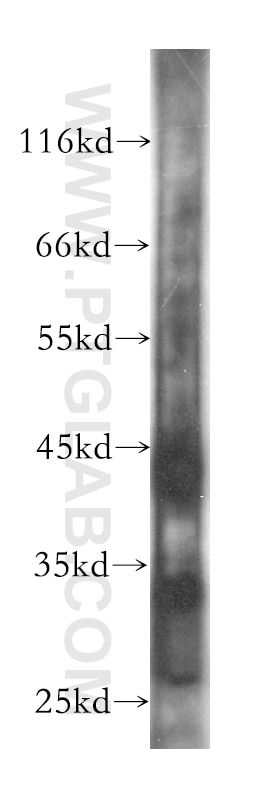Validation Data Gallery
Tested Applications
Recommended dilution
| Application | Dilution |
|---|---|
| It is recommended that this reagent should be titrated in each testing system to obtain optimal results. | |
| Sample-dependent, Check data in validation data gallery. | |
Product Information
60036-1-Ig targets TPI1 in ELISA applications and shows reactivity with human, mouse samples.
| Tested Reactivity | human, mouse |
| Host / Isotype | Mouse / IgM |
| Class | Monoclonal |
| Type | Antibody |
| Immunogen |
CatNo: Ag1175 Product name: Recombinant human TPI1 protein Source: e coli.-derived, PGEX-4T Tag: GST Domain: 1-249 aa of BC007086 Sequence: MAPSRKFFVGGNWKMNGRKQSLGELIGTLNAAKVPADTEVVCAPPTAYIDFARQKLDPKIAVAAQNCYKVTNGAFTGEISPGMIKDCGATWVVLGHSERRHVFGESDELIGQKVAHALAEGLGVIACIGEKLDEREAGITEKVVFEQTKVIADNVKDWSKVVLAYEPVWAIGTGKTATPQQAQEVHEKLRGWLKSNVSDAVAQSTRIIYGGSVTGATCKELASQPDVDGFLVGGASLKPEFVDIINAKQ 相同性解析による交差性が予測される生物種 |
| Full Name | triosephosphate isomerase 1 |
| Calculated molecular weight | 27 kDa |
| GenBank accession number | BC007086 |
| Gene Symbol | TPI1 |
| Gene ID (NCBI) | 7167 |
| Conjugate | Unconjugated |
| Form | |
| Form | Liquid |
| Purification Method | Thiophilic affinity chromatograph |
| UNIPROT ID | P60174 |
| Storage Buffer | PBS with 0.02% sodium azide and 50% glycerol{{ptg:BufferTemp}}7.3 |
| Storage Conditions | Store at -20°C. Stable for one year after shipment. Aliquoting is unnecessary for -20oC storage. |
Background Information
TPI1(Triosephosphate isomerase) is also named as TIM, TPI and belongs to the triosephosphate isomerase family. It is a key enzyme in cell metabolism that controls the glycolytic flow and energy production through the interconversion of dihydroxyacetone phosphate (DHAP) and D-glyceraldehyde 3-phosphate (G3P)(PMID:19251756). Defects in TPI1 are the cause of triosephosphate isomerase deficiency (TPI deficiency). It can exsit as a homodimer(PMID:18562316).

